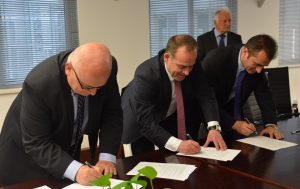На 28 април във Варшава, Полша Съюзът на международните превозвачи беше съорганизатор на среща на сдруженията в автомобилния транспорт от Полша, България, Хърватия, Румъния и Литва.
На срещата се разискваха протекционистичните мерки, въведени от т. нар. Стари държави в Европейския съюз, по – специално Законите за минимална работна заплата във Франция и Германия (Loi Macron иMiLog), както и Закона за борба със социалния дъмпинг, приет в Австрия, и средствата за противодействие срещу тях.
Оказа се, че тези мерки засягат не само българските превозвачи, но и техните колеги от останалите участващи държави.
„Всички ние сме тук днес, защото имаме едни и същи проблеми. Трябва да предприемем конкретни стъпки, за да бъдем чути в Брюксел. Вярвам, че ако работим заедно, можем да решим тези проблеми бързо и ефикасно“ – каза по време на срещата г-н Йордан Арабаджиев – Изпълнителен директор на Съюза на международните превозвачи.
Първата крачка към успешно сътрудничество беше направена – подписването на Меморандум за разбирателство между участващите държави и създаването на Алианс за бъдещето на транспорта. Меморандумът е отворен за сдружения на превозвачите и от други държави от Централна и Източна Европа, като в него беше постигнато съгласие за изработване на общи позиции относно ревизията на Регламент 561/2006 (включително инфрийнджмънт казусите, свързани със седмичните почивки във Франция, Белгия, Германия), Регламент 1071/2009 и Регламент 1072/2009, както и Директивата за командироването на работници или всякакви други местни норми или норми на ЕС, влияещи върху свободното движение на услуги в транспорта, както и за съвместни действия, включително правни инициативи, целящи елиминиране на всякакви форми на дискриминация на международните превозвачи от Централна и Източна Европа и протекционизъм .
Участниците подчертаха ролята на транспорта за европейската икономика и отрицателния ефект, който законодателството на „големите“ европейски държави има върху общия европейски пазар. Подчерта се, че законите за минималната работна заплата противоречат на принципите на свободно движение на стоки и услуги в рамките на Европейския съюз, залегнали в Договора за функциониране на съюза.
По време на срещата бе постигнато съгласие за обединение на транспортните асоциации от различните държави за предприемане на общи стъпки преди приемането на „транспортния пакет“ на 31 май от Европейската комисия, за да се даде възможност за активно участие в нормотворческия процес.
По този начин се положи началото на едно бъдещо обединение на усилията на транспортните организации на държавите от Централна и Източна Европа за борба срещу протекционистичната политика на определени държави от Европейския съюз.
С текста на меморандума може да се запознаете тук



[:en]On 28 April 2017 in Warsaw, Poland, The Union of International Hauliers was a co-organiser of a meeting of the associations in road transport from Poland, Bulgaria, Croatia, Romania and Lithuania.
At the meeting there was a discussion about the protectionist measures introduced by the so called “Old countries” in the European Union, in particular – the minimum wage legislation in France and Germany (Loi Macron and MiLog) as well as the Anti-Wage And Social Dumping Act adopted in Austria and the ways for counteraction to them.
It turned out that these measures concern not only the Bulgarian hauliers but also their colleagues from the rest of the participating countries.
„We are all here today because we have the same problems. We must undertake concrete steps to be heard in Brussels. I believe that if we work together we can solve these problems in a quick and efficient manner“ – said during the meating Mr. Yordan Arabadzhiev – Executive Director of The Union of International Hauliers.
The first step towards successful cooperation was made – signing a Memorandum of Understanding between the participating countries and creation of an Alliance For the Future of The Transport. The Memorandum is open for associations of hauliers from other countries from Central and Eastern Europe.There was agreement for elaborating common positions regarding the revision of Regulation 561/2006 (includingly the infringement cases connected with weekly rests in France, Belgium, Germany), Regulation 1071/2009 and Regulation 1072/2009 as well as the Posting of Workers Directive or any other local or EU regulations affecting the free movement of services in the transport sphere. The organisations also agreed on conducting joint actions, includingly legal initiatives aiming at elimination of any forms of discrimination of the international hauliers from Central and Eastern Europe and protectionism.
The participants underlined the role of transport for the European economics and the negative effect of the legislation of the “big” European countries over the common European market. It has been emphasized that the minimum wage laws contradict to the principles of free movement of goods and services within the European Union stated in the Treaty on the Functioning of the European Union.
During the meeting there was agreement for unification of the transport associations from the different countries for undertaking joint steps prior to the adoption of the “transport package” by the European Commission on 31 May to enable the active participation in the decision-making process.
In this way was set the beginning of a future unification of the efforts of the transport organisations of the countries from Central and Eastern Europe for fighting against the protectionist policy of certain countries from the European Union.
You can see the text of the text of the here
